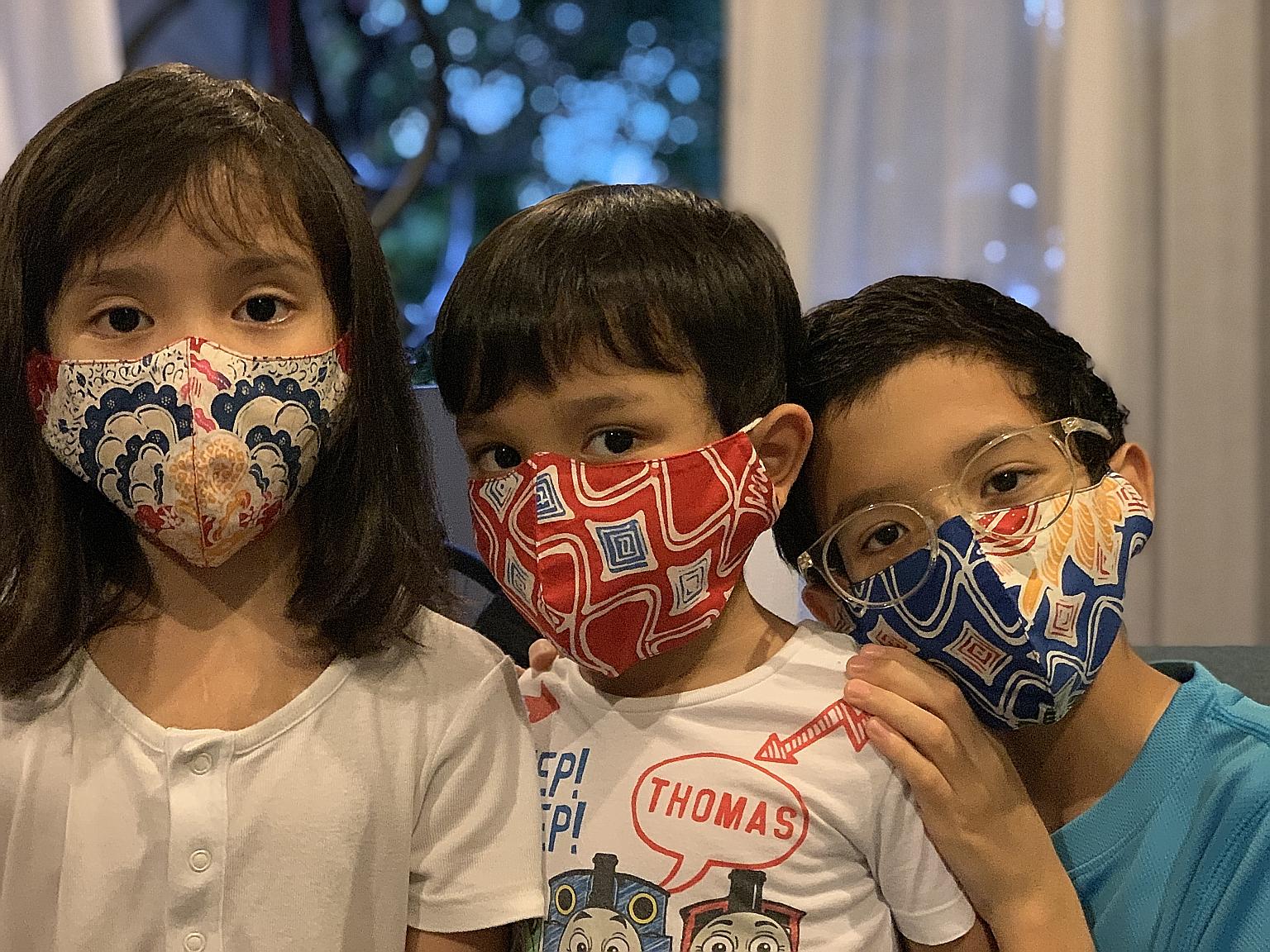COVID-19 SPECIAL
From clothing line to batik-print masks: Remnant fabrics made into zero-waste masks
Sign up now: Get ST's newsletters delivered to your inbox

Fashion entrepreneur Oniatta Effendi makes adults’ and children’s masks out of fabrics left over from her clothing collection.
PHOTO: COURTESY OF ONIATTA EFFENDI
Since early last month, fashion entrepreneur Oniatta Effendi has overhauled her clothing line Baju by Oniatta into a mini mask facility, making masks in an array of striking batik prints.
The fabrics used are remnant materials of her former collections - off-cuts leftover from where sarong patterns had been cut, then kept aside.
"I can proudly declare that this set of masks is zero-waste," says the owner of boutique Galeri Tokokita.
Sales for her clothing line had been dwindling since Chinese New Year, preparing her for the "big dip", the 46-year-old says.
Then about a month ago, before the Government started issuing masks, she dug up an old checker-print mask a friend had bought from Vietnam. "I got inspired. I thought, you know, we could do this with our remnants."
Making masks keeps a small team of home-based seamstresses in Jakarta afloat.
She realised her tailor contact there had stopped receiving business, as clothing production globally was put on hold.
Ms Oniatta sent pictures and measurements of her checker-print mask as a sample, and the seamstresses got to work turning the off-cuts into an initial 200 masks - 100 each for adults and children.
She put up an order form on her social-media channels two weeks ago and orders poured in.
Back home in Singapore, she runs the mask business as a one-woman outfit. Her children help out on the weekends, addressing envelopes and sticking on stamps.
She then bikes to the mailbox to post orders. About 400 of the colourful cotton masks - which retail at $10 each, regardless of size - have already been mailed out to customers here.
The next batch, to be released online early next week, will feature masks made of lurik, a traditional hand-woven cotton.
It is not just the seamstresses who depend on her. For her clothing line, Ms Oniatta works with traditional batik-makers from rural villages in Yogyakarta and Surakarta (or Solo) to craft new fabrics from scratch, colouring and stamping them by hand when commissioned.
They remain short of work for now, as she works her way through her remnant fabrics. But the designer already has plans to commission new pieces once her remnants run out.
Until then, every order placed is a surprise. Customers can fill in a "colour preference" option, after which, she mixes and matches available fabrics to preferences as best she can.
For some repeat clients whom she knows personally, she makes it a point to find the specific remnant that matches a piece they bought from her previous collections.
It makes for the perfect reusable accessory. "It's just like buying a batik outfit - you would like to keep it forever."
Maisons making masks, gowns, sanitisers
The trend of pivoting to more essential productions is part of a larger one echoed around the world. Many luxury fashion houses have also put on pause regular production to help fight Covid-19 in their own way.
Here are a few notable ones.
BURBERRY
The British fashion house has swopped its iconic plaid trench coats for non-surgical gowns and masks, produced in the label's trench coat factory in Castleford, Yorkshire.
BVLGARI
In March, as Italy became the epicentre of the pandemic, Bvlgari converted its fragrance production in Lombardy, Italy, to solely manufacture hand sanitising gel. More than 20,000 units have been donated to hospitals and medical facilities across Italy and Switzerland.
From this month, the Italian house, part of the LVMH Group, will donate over 160,000 more bottles to Britain in portable 75ml sizes for medical staff to carry on hand.
CHANEL
To bolster supplies in France, Chanel began mobilising its partner manufacturers to produce face masks and medical gowns, tapping some 150 sewing specialists from the house's haute couture, ready-to-wear and Maisons d'Art workshops.
CHRISTIAN DIOR
Reopening its Redon workshop in Brittany, France - which usually makes Baby Dior clothes - Christian Dior is making masks for French workers in essential services.
LOUIS VUITTON
The French house repurposed its 12 workshops in France to produce non-surgical masks for healthcare workers and vulnerable communities. Over 300 leather goods artisans were tapped to do so.
At the label's ready-to-wear atelier in Paris, hospital gowns are in production to be distributed to front-line healthcare workers in Parisian hospitals.
PRADA
Italian house Prada kept its factory in Montone, Italy, open to make 80,000 medical overalls and 110,000 face masks to distribute around the region.


